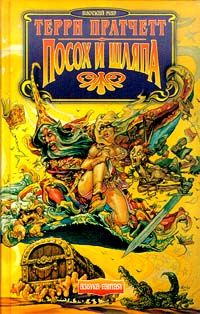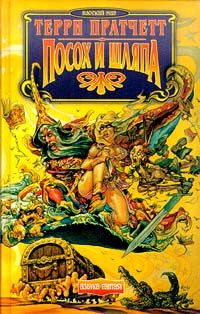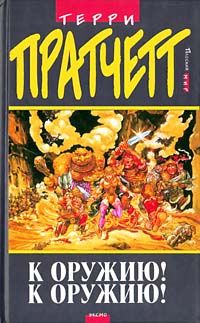Terry Pratchett - I Shall Wear Midnight
You didn’t need to be a witch to understand it. The world around you became more – well, more real and fluid, at those special times. Nanny Ogg called it numinous – an uncharacteristically solemn word from a woman who was much more likely to be saying, ‘I would like a brandy, thank you very much, and could you make it a double while you are about it.’ And she had told Tiffany about the old days, when it seemed that witches had a bit more fun. The things that you did around the changing of the seasons, for example; all the customs that were now dead except in folk memory which, Nanny Ogg said, is deep and dark and breathing and never fades. Little rituals.
Tiffany especially liked the one about the fire. Tiffany liked fire. It was her favourite element. It was considered so powerful, and so scary to the powers of darkness that people would even get married by jumping over a fire together4. Apparently it helped if you said a little chant, according to Nanny Ogg, who lost no time in telling Tiffany the words, which immediately stuck in Tiffany’s mind; a lot of what Nanny Ogg told you tended to be sticky.
But those were times gone by. Everybody was more respectable now, apart from Nanny Ogg and the giant.
There were other carvings on the Chalk lands too. One of them was a white horse that Tiffany thought had once broken its way out of the ground and galloped to her rescue. Now she wondered what would happen if the giant did the same thing, because it would be very hard to find a pair of pants sixty feet long in a hurry. And on the whole, you’d want to hurry.
She’d only ever giggled about the giant once, and that had been a very long time ago. There were really only four types of people in the world: men and women and wizards and witches. Wizards mostly lived in universities down in the big cities and weren’t allowed to get married, although the reason why not totally escaped Tiffany. Anyway, you hardly ever saw them around here.
Witches were definitely women, but most of the older ones Tiffany knew hadn’t got married either, mostly because Nanny Ogg had already used up all the eligible husbands, but also probably because they didn’t have time. Of course, every now and then, a witch might marry a grand husband, like Magrat Garlick, as was, of Lancre had done, although by all accounts she only did herbs these days. But the only young witch Tiffany knew who had even had time for courting was her best friend up in the mountains: Petulia – a witch who was now specializing in pig magic, and was soon going to marry a nice young man who was shortly going to inherit his father’s pig farm,5 which meant he was practically an aristocrat.
But witches were not only very busy, they were also apart , Tiffany had learned that early on. You were among people, but not the same as them. There was always a kind of distance or separation. You didn’t have to work at it, it happened anyway. Girls she had known when they were all so young they used to run about and play with only their vests on would make a tiny little curtsy to her when she passed them in the lane, and even elderly men would touch their forelock, or probably what they thought was their forelock, as she passed.
This wasn’t just because of respect, but because of a kind of fear as well. Witches had secrets; they were there to help when babies were being born. When you got married, it was a good idea to have a witch standing by (even if you weren’t sure if it was for good luck or to prevent bad luck), and when you died there would be a witch there too, to show you the way. Witches had secrets they never told … well, to people who weren’t witches. Among themselves, when they could get together on some hillside for a drink or two (or in the case of Mrs Ogg, a drink or nine), they gossiped like geese.
But never about the real secrets, the ones you never told, about things done and heard and seen. So many secrets that you were afraid they might leak. Seeing a giant without his trousers was hardly worth commenting on compared to some of the things that a witch might see.
No, Tiffany did not envy Petulia her romance, which surely must have taken place in big boots, unflattering rubber aprons and the rain, not to mention an awful lot of ‘oink’.
She did, however, envy her for being so sensible. Petulia had got it all worked out. She knew what she wanted her future to be, and had rolled up her sleeves and made it happen, up to her knees in ‘oink’ if necessary.
Every family, even up in the mountains, kept at least one pig to act as a garbage can in the summer and as pork, bacon, ham and sausages during the rest of the year. The pig was important; you might dose Granny with turpentine when she was poorly, but when the pig was ill you sent immediately for a pig witch, and paid her too, and paid her well, generally in sausages.
On top of everything else, Petulia was a specialist pig borer, and indeed she was this year’s champion in the noble art of boring. Tiffany thought you couldn’t put it better; her friend could sit down with a pig and talk to it gently and calmly about extremely boring things until some strange pig mechanism took over, whereupon it would give a happy little yawn and fall over, no longer a living pig and ready to become a very important contribution to the family’s diet for the following year. This might not appear the best of outcomes for the pig, but given the messy and above all noisy way pigs died before the invention of pig boring, it was definitely, in the great scheme of things, a much better deal all round.
Alone in the crowd, Tiffany sighed. It was hard, when you wore the black, pointy hat. Because, like it or not, the witch was the pointy hat, and the pointy hat was the witch. It made people careful about you. They would be respectful, oh yes, and often a little bit nervous, as if they expected you to look inside their heads, which as a matter of fact you could probably do, using the good old witch’s standbys of First Sight and Second Thoughts.6 But these weren’t really magic. Anyone could learn them if they had a lick of sense, but sometimes even a lick is hard to find. People are often so busy living that they never stopped to wonder why. Witches did, and that meant them being needed: oh yes, needed – needed practically all the time, but not, in a very polite and definitely unspoken way, not exactly wanted.
This wasn’t the mountains, where people were very used to witches; people on the Chalk could be friendly, but they weren’t friends, not actual friends. The witch was different. The witch knew things that you did not. The witch was another kind of person. The witch was someone that perhaps you should not anger. The witch was not like other people.
Tiffany Aching was the witch, and she had made herself the witch because they needed one. Everybody needs a witch, but sometimes they just don’t know it.
And it was working. The storybook pictures of the drooling hag were being wiped away, every time Tiffany helped a young mother with her first baby, or smoothed an old man’s path to his grave. Nevertheless, old stories, old rumours and old picture books still seemed to have their own hold on the memory of the world.
What made it more difficult was that there was no tradition of witches on the Chalk – none would ever have settled there when Granny Aching had been alive. Granny Aching, as everybody knew, was a wise woman, and wise enough not to be a witch. Nothing ever happened on the Chalk that Granny Aching disapproved of, at least not for more than about ten minutes.
So Tiffany was a witch alone.
And not only was there no longer any support from the mountain witches like Nanny Ogg, Granny Weatherwax and Miss Level, but the people of the Chalk weren’t very familiar with witches. Other witches would probably come and help if she asked, of course, but although they wouldn’t say so, this might mean that you couldn’t cope with responsibility, weren’t up to the task, weren’t sure, weren’t good enough.
‘Excuse me, miss?’ There was a nervous giggle. Tiffany looked round and there were two little girls in their best new frocks and straw hats. They were looking at her eagerly, with perhaps just a hint of mischief in their eyes. She thought quickly and smiled at them.
‘Oh yes, Becky Pardon and Nancy Upright, yes? What can I do for the two of you?’
Becky Pardon shyly produced a small bouquet from behind her back and held it out. Tiffany recognized it, of course. She had made them herself for the older girls when she was younger, simply because it was what you did, it was part of the scouring: a little bunch of wild flowers picked from the downland, tied in a bunch with – and this was the important bit, the magic bit – some of the grass pulled up as the fresh chalk was exposed.
‘If you put this under your pillow tonight, you will dream of your beau,’ said Becky Pardon, her face quite serious now.
Tiffany took the slightly wilting bunch of flowers with care. ‘Let me see …’ she said. ‘We have here sweet mumbles, ladies’ pillows, seven-leaf clover – very lucky – a sprig of old man’s trousers, jack-in-the-wall, oh – love-lies-bleeding and …’ She stared at the little white and red flowers.
The girls said, ‘Are you all right, miss?’
‘Forget-me-lots!’7 said Tiffany, more sharply than she had intended. But the girls hadn’t noticed, so she continued to say, brightly, ‘Quite unusual to see it here. It must be a garden escapee. And, as I’m sure you both know, you have bound them all together with strips of candle rush, which once upon a time people used to make into rush lights. What a lovely surprise. Thank you both very much. I hope you have a lovely time at the fair …’
Becky raised her hand. ‘Excuse me, miss?’
‘Was there something else, Becky?’
Becky went pink, and had a hurried conversation with her friend. She turned back to Tiffany, looking slightly more pink but nevertheless determined to see things through.
‘You can’t get into trouble for asking a question, can you, miss? I mean, just asking a question?’
It’s going to be ‘How can I be a witch when I’m grown up?’ Tiffany thought, because it generally was. The young girls saw her on her broomstick and thought that was what being a witch was. Out loud she said, ‘Not from me, at least. Do ask your question.’
Becky Pardon looked down at her boots. ‘Do you have any passionate parts, miss?’
Another talent needful in a witch is the ability not to let your face show what you’re thinking, and especially not allowing it, no matter what, to go as stiff as a board. Tiffany managed to say, without a single wobble in her voice and no trace of an embarrassed smirk, ‘That is a very interesting question, Becky. Can I ask you why you want to know?’
The girl looked a lot happier now that the question was, as it were, out in the public domain.
‘Well, miss, I asked my granny if I could be a witch when I was older, and she said I shouldn’t want to, because witches have no passionate parts, miss.’
Tiffany thought quickly in the face of the two solemn owlish stares. These are farm girls, she thought, so they had certainly seen a cat have kittens and a dog have puppies. They’d have seen the birth of lambs, and probably a cow have a calf, which is always a noisy affair that you can hardly miss. They know what they are asking me about.
At this point Nancy chimed in with, ‘Only, if that is so, miss, we would quite like to have the flowers back, now we’ve shown them to you, because perhaps it might be a bit of a waste, meaning no offence.’ She stepped back quickly.
Tiffany was surprised at her own laughter. It had been a long time since she had laughed. Heads turned to see what the joke was, and she managed to grab both the girls before they fled, and spun them round.
‘Well done, the pair of you,’ she said. ‘I like to see some sensible thinking every now and again. Never hesitate to ask a question. And the answer to your question is that witches are the same as everybody else when it comes to passionate parts, but often they are so busy rushing around that they never have time to think about them.’
The girls looked relieved that their work had not been entirely in vain and Tiffany was ready for the next question, which came from Becky again. ‘So, do you have a beau, miss?’
‘Not right at the moment,’ Tiffany said briskly, clamping down on her expression lest it give anything away. She held up the little bouquet. ‘But who knows, if you’ve made this properly, then I’ll get another one, and in that case you will be better witches than me, that is for certain.’ They both beamed at this dreadful piece of outright flannel, and it stopped the questions.
‘And now,’ said Tiffany, ‘the cheese rolling will be starting at any minute. I’m sure you won’t want to miss that.’
‘No, miss,’ they said in unison. Just before they left, full of relief and self-importance, Becky patted Tiffany on her hand. ‘Beaus can be very difficult, miss,’ she said with the assurance of, to Tiffany’s certain knowledge, eight years in the world.
‘Thank you,’ said Tiffany. ‘I shall definitely bear that in mind.’
When it came to the entertainment offered at the fair, such as people making faces through a horse collar or fighting with pillows on the greasy pole or even the bobbing for frogs, well, Tiffany could take them or leave them alone, and in fact much preferred to leave them alone. But she always liked to see a good cheese roll – that is to say, a good cheese roll all the way down a slope of the hill, although not across the giant because no one would want to eat the cheese afterwards.
They were hard cheeses, sometimes specially made for the cheese-rolling circuit, and the winning maker of the cheese that reached the bottom unscathed won a belt with a silver buckle and the admiration of all.
Tiffany was an expert cheese-maker, but she had never entered. Witches couldn’t enter that sort of competition because if you won – and she knew she had made a cheese or two that could win – everyone would say that was unfair because you were a witch; well, that’s what they would think, but very few would say it. And if you didn’t win, people would say, ‘What kind of witch can’t make a cheese that could be beat by simple cheeses made by simple folk like we?’
There was a gentle movement of the crowd to the start of the cheese rolling, although the frog-bobbing stall still had a big crowd, it being a very humorous and reliable source of entertainment, especially to those people who weren’t actually bobbing. Regrettably, the man who put weasels down his trousers, and apparently had a personal best of nine weasels, hadn’t been there this year, and people were wondering if he had lost his touch. But sooner or later everyone would drift over to the start line for the cheese rolling. It was a tradition.
The slope here was very steep indeed and there was always a certain amount of boisterous rivalry between the cheese-owners, which led to pushing and shoving and kicking and bruises; occasionally you got a broken arm or leg. All was going as normal as the waiting men lined up their cheeses, until Tiffany saw, and seemed to be the only one to see, a dangerous cheese roll up all by itself. It was black under the dust and there was a piece of grubby blue and white cloth tied to it.



